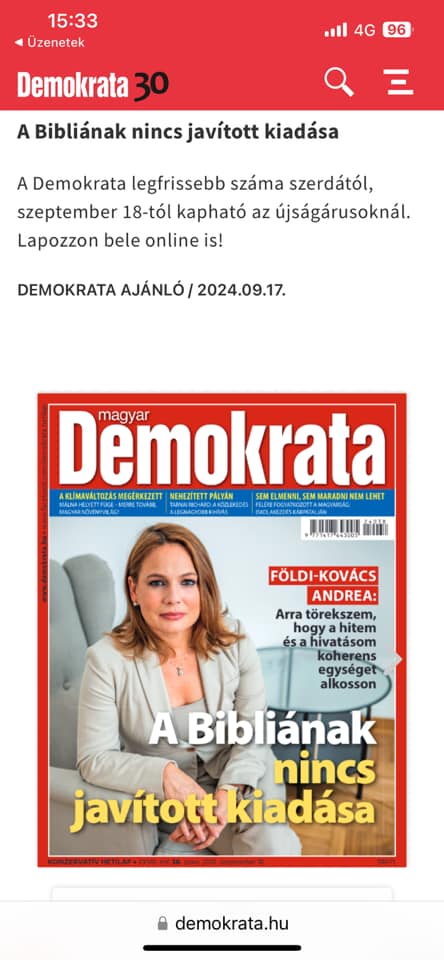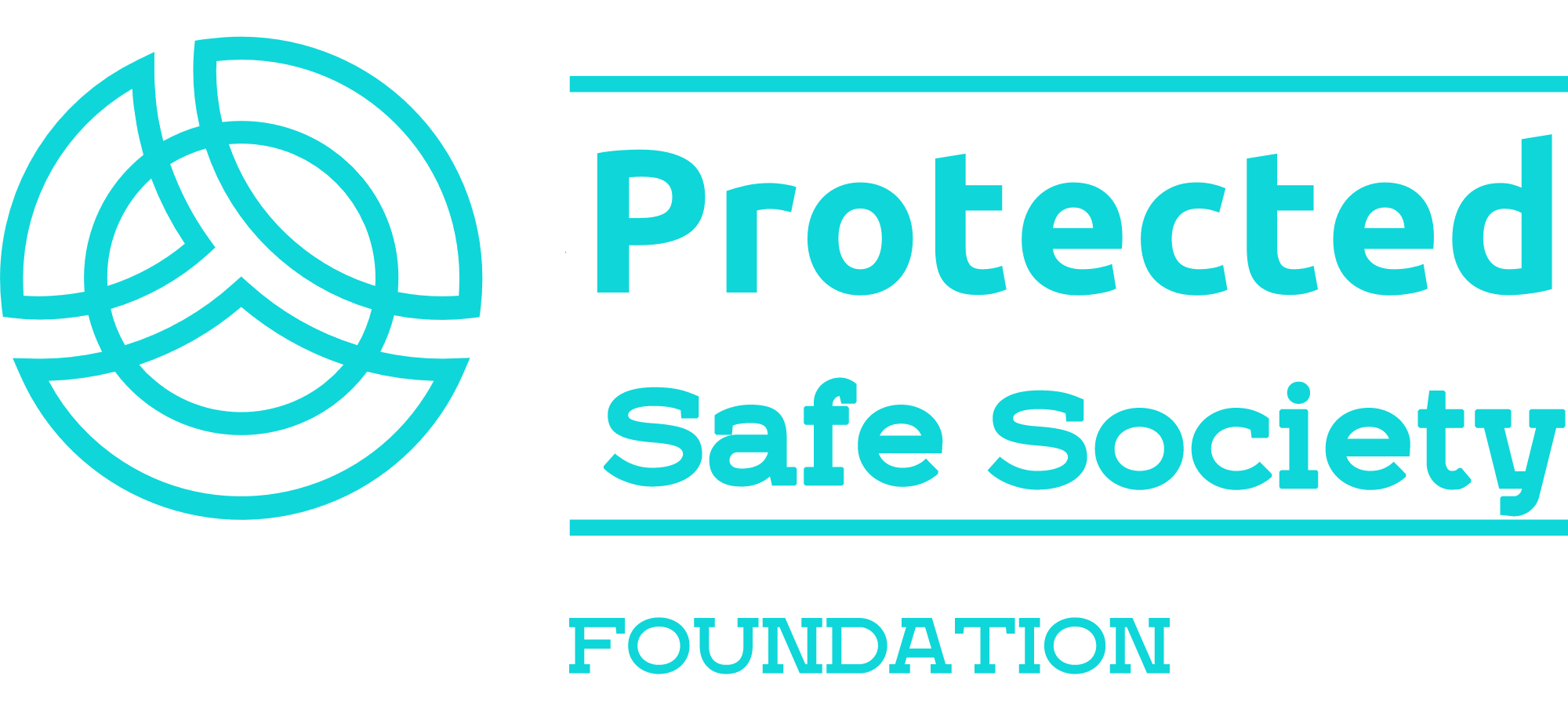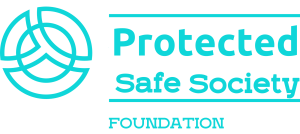“My goal is to create a coherent unity between my faith and my calling”
Andrea Földi-Kovács: There is no revised edition of the Bible
Andrea Földi-Kovács believes that standing for the protection of life is standing for justice. As the patron of the “Every Birthday Matters” walk, she points out that while the law punishes severely if anyone harms a born child, the lives of unborn children are not protected as if they were second-class citizens. We talked to the former TV host about our dependency on technology, all-encompassing materialism, and the role of Christians.
– You were known as a political TV host, then you showed a different side of yourself in the program “Credo”. A few years ago, you completely left television. Why did you decide this way?
– Many assume that such a big change always has a single specific reason, but it doesn’t work that way. In my case, several factors played a role, and the decision had been brewing in me for a long time. As a television reporter, I dealt with many social phenomena, and some of the current events became not just interview topics to process but also matters close to my heart.

I wanted to delve deeper into certain issues and do more, take meaningful steps in certain matters. Life protection or sexual ethics are typically such topics for me.
– Have you reached a point where you’ve appeared too much on camera?
– Today, the public and the balance between a public life and a private life are part of my calling. And I try to maintain a healthy balance. The emphasis in my life has also changed. Instead of current events, I started focusing on the larger, overarching questions behind daily events. I try to understand and interpret these things. My goal is to create a coherent unity between my faith and my calling. My current program “Carpe Deum” reminds us that our lives are part of a larger story, with God at the center. What if we didn’t just seize the moment, but also seized the presence of God, every day, in every social or cultural issue, in every current challenge?
– Many people only superficially inform themselves in the information overload. How can we still reach people in this noise?
– Ancient Greek philosophers brought Paul to the Areopagus to explain his beliefs. According to Pope St. John Paul II, the modern age’s first Areopagus is the world of communication, which unites humanity and turns it into a so-called global village. For me, this clearly sets the directions. We need to speak where we are heard and in a way that others understand. According to Carl R. Trueman, a Presbyterian pastor, whose book “The Rise and Triumph of the Modern Self” we recently published in Hungarian, the Christian’s task is not to complain about the era in which he lives, but to understand its problems and provide adequate answers.
– How would you characterize your current activities?
– If I had to express it briefly, it would be cultural defense of faith, apologetics. I create video essays in which I aim to bring Christian social teachings closer to people, providing tools, arguments on certain topics. Many, increasingly more people believe that successful media products must go against Christian morality. I have always disagreed with this and with all my work and programs, I tried to refute it. Because every impactful story is essentially an answer to a major moral question. I deal with these questions. And I try to encourage viewers to draw from the source available to us. In preparation, research, and writing, I read St. Teresa of Avila, St. John of the Cross, C. S. Lewis, or even Timothy Keller. And I try to present and recommend the works used.
– You talk a lot about “friendly Christianity.” What do you mean by that?
– Often we only see Jesus as a teacher, which is not enough. The commandments can seem like insurmountable demands if we only see prohibition or teaching in them. However, when someone surrenders to God and truly puts Him first, grace enters their life, allowing these commandments to be fulfilled. Not by our own strength, but by God’s grace. But we must not stop halfway! I did this, that’s why I talk about it a lot when I can. Because I know how difficult it is to turn away from Sunday Christianity. “Do not deceive yourselves!” – says Paul in the first Corinthians. Let’s not say that God demanded something from us two thousand years ago in a completely different cultural environment, and this is definitely not true today because today’s era has changed, the understanding is completely different. There is no revised edition of the Bible, no Scripture 2.0, the Ten Commandments are still valid, just as they were in Moses’ time. We should rather think about where we need to grow.
– Huge powers are moving through the media to deter the seeking person. Just a few decades ago, could we have imagined the topics and issues that you are dealing with?
– Aleksandr Solzhenitsyn said in the 1980s, “People have forgotten God, and that’s why all this has happened.” I couldn’t present the whole process that took place in Western culture, but there are certain key points that should be highlighted. One of these is that over history, most people believed that we are both physical and spiritual beings, but the rise of science has questioned the existence of the soul. The reality of human nature as both body and soul. Atheists and materialist philosophers have declared that man is nothing more than his body. It is strongly felt in today’s man that he only thinks in the physical reality. This spiritual vacuum that dominates today is partly the result of this.
– What other turning points do you see?
– Moral order has always been based on the transcendent, but modern man no longer builds his morality on the sacred. Today’s society prioritizes emotions and impressions. This has led to the strengthening of individualism, which has destabilized the foundations of society. Modern man says, “good” is what makes me happy. And anything that restricts my happiness is “bad.” This process did not start with the sexual revolution, but already in the age of enlightenment when they started breaking down the pillars that preserved the order of society for centuries.
– Many believe that while the situation has deteriorated in the West, everything is fine at home. What do you think about this?
– We are also part of the global community, and through the internet, our young people are exposed to the same influences as those in the West. Although the situation in Hungary is better in many ways, we cannot live in a false sense of security. Our research at the Axioma Institute has shown that a significant portion of Hungarian youth encounter harmful online content, such as pornography, and fall into addiction. Addiction is often linked only to some substance, such as alcohol or drugs. However, the phenomenon affects modern societies widely. We live in a rich environment of stimuli, where we almost imperceptibly become compulsive consumers. The media noise surrounding us, the influx of information and impulses, and even technology itself make us addicted to our smartphones’ notifications, ringtones, and constantly updating feeds. In reality, the constant self-rewarding, dopamine overflow is one of the most important modern stress factors, meaning we are not physiologically equipped for this overflowing abundance-rich world. Therefore, we cannot enjoy life’s small pleasures because we constantly keep our dopamine levels high. Our children are even more exposed to this because their brains are still developing. The decision-making center of the brain, the frontal lobe, develops until age 25. We need to lead people back to real life, to reality from the offline world and the haze of overconsumption.
– Do you consider school mobile restrictions important?
– Yes, definitely. It is not accidental and not without precedent that there is a debate across Europe about children’s mobile phone usage. According to OECD studies, unrestricted mobile phone use has been shown to impair children’s attention and thus their academic performance. Norway, Sweden, and Finland had previously banned cellphones in schools, and France, for example, recommends that children not use mobile phones until age 11 and should not have access to the internet until age 13. Many places have taken such and even stricter measures. Many educational researchers and educators in Hungary speak about this, one of them being Rita Uzsalyné Pécsi, who has been emphasizing the harmful effects of digital devices for a long time. Practicing parents all face this problem.
– Life protection and changing attitudes towards abortion are close to your heart. Why do you consider this to be so important?
– A few years ago, a researcher from the University of Chicago went to interview the population and asked: Who determines when life begins? Eighty percent of them said that biologists, as it is a biological question. So he asked 5500 biologists when human life begins. Ninety-five percent of biologists, regardless of worldview, said it begins at conception. Therefore, scientifically speaking, the answer is very clear. A fetus is alive from conception. Since the discovery of DNA, it’s not even a question that it is human. Generally, people instinctively know that preserving life is right, and taking life is wrong. We all know that no extraordinary performance is required for a person’s life to matter, and we all agree that human life is inherently valuable. On a principle level – or after their birth.
– Yet, we can see and hear exactly what is happening in the womb.
– The real problem of our time is not ignorance. I am pro-life because science shows that the unborn fetus is a human being, and I believe that every human being is unique and irreplaceable, and every human life has value. Therefore, our stance is usually based on facts and emerges within the appropriate ethical framework. Young people recognize that human rights are important, and that sometimes sacrifices must be made for them. Today, more of them are aware of basic biological facts. However, they still maintain a different ethical stance towards conceived life. Therefore, we must focus on what is right. One of the biggest lies told to young people is that having a child will ruin their lives. That there is a contradiction between right actions and personal fulfillment. In my lectures, I gladly share my own life experience with them. I became a mother at 21, and my daughter’s arrival not only enriched my life with responsibility but also incredible joy. In fact, I did things for her that I probably would never have done for myself. It was an incredible motivation for me.
– What can be achieved today regarding the issue of abortion?
– Those vulnerable lives threatened within the womb need to be placed under social protection. Developed Western societies are known for treating the weak, vulnerable responsibly, ensuring that the elderly, the sick, and children enjoy special legal protection. But who, if not the unborn fetuses growing within the womb, are the most vulnerable of all? To trample on the weak requires no strength; it takes strength to protect them! I believe that standing for life is standing on the side of science, standing for life is standing on the side of justice.
– How do you see the regulation regarding abortion?
– In Hungary, abortion can be carried out until the 12th week of pregnancy, usually when requested by the mother citing a crisis situation. If the mother is a minor, then abortion can be performed until the 18th week, and if a severe anomaly is diagnosed in the fetus, then it can be performed until the 20-22, even 23 weeks. There are countries where it is legal up to the 20th week, some places up to the 25th week. But we know of an American state where abortion is legal up to the 9th month if the mother is in severe mental crisis. And then there’s the other extreme, the heartbeat law that several American states have enacted. Therefore, depending on where a child would be born, different legal protections apply. But let me say this: if anyone harms a born child, the law punishes them with full severity, but we do not protect the life of the same child within the womb. It’s as if the fetus is a second-class citizen.
– Do we talk enough about this? It seems that many people still have very limited knowledge about abortion.
– Many do not dare to talk about this because in Hungary, 6.5 million abortions have been carried out since it was legalized in 1956. We also talk in the interest of the affected mothers because there are many unprocessed emotional wounds and traumas in Hungarian society. We need to help generations of women heal so they can mourn these children. Post-abortion syndrome is a real phenomenon. Unspoken emotional traumas remain with the mother for life. But not only emotional, there can also be physical consequences of abortion: infertility, problematic pregnancies, various complications, ectopic pregnancies.
– Many abortion advocates refer to difficult life situations. Can these difficulties be overcome?
– A woman who is considered to be in a crisis due to existential, relationship, or health reasons, i.e., where the life of her conceived child is in danger, must be helped in every way possible. In a way that respects her freedom, dignity, and life of both her and her child. If a woman is experiencing a crisis, is afraid of shame, stigma, or is in a desperate social situation, has some health risks, her fear overrides the life-giving maternal instinct. This leads to a narrowed state of consciousness, right up to the decision-making. Should she keep the child or not? In this situation, if she receives mental support, financial help, any support that reduces her uncertainty, the confusion around her, she can get out of the crisis. Abortion does not solve existential problems, does not solve relationship crises, but causes further problems, mental trauma.
– Hungary has seen a decrease in the number of abortions for many years. Perhaps something has shifted?
– This is definitely a welcome development, but it also contributes to the decrease in the number of women of childbearing age. The only slight shift was just last year when there were slightly more abortions performed than the previous year, with 21,200 abortions carried out. This is sixty fetal lives per day! If sixty preschool-age children were to die every day, we would have extraordinary news announced on TV every night, and people would be buried under pain. This entire drama unfolds every year in Hungary and all around the world with unbelievable indifference. Three-quarters of Hungarians agree that a woman should be able to terminate her undesired pregnancy freely. We should also talk about the fact that many couples are waiting to adopt a child, so as a last option, there is also the possibility of adoption.
– As one of the patrons of the “Every Birthday Matters” walk, you emphasize that the pro-life stance does not differ much from the majority view. What is the majority standpoint?
– From a certain point, most people think that the fetus should be protected. There is not a big difference in this, the only debate might be about when this point arrives. We, as pro-lifers, say there is no such thing as a potential person. The fetus is a human being who is alive from conception! Therefore, from the moment of conception, it should enjoy the protection that comes from human rights. This is an extended ethical framework that is also applicable within the womb. Some say that the fetus is not a human being because it’s “only” a fetus. The Latin word for fetus means a young human individual. So, the fetus is in a stage of human development. Trent Horn, an apologist from the Catholic Answers organization, writes in his book: it’s as if we were to say that a teenager is not a human because they are just a teenager.
– What is the goal of the movement?
– We embark together because we envision a future world where everyone appreciates and protects the beauty and dignity of every human life. We want to mobilize pro-life people in public life! It is a great joy for us that alongside the founder Gábor Szemkeő and the spokesperson Sári Pontifex, the main patrons of our team include Ilona Keresztes, the founder of Youth for Life Service and leader of Together for Life, Edit Frivaldszky, the president of the Center for Human Dignity, and Gábor Móczár. Their support. It is incredibly important to have the support of Ágnes Dékány and Balázs Bálint gynecologists, and András Csókay, a neurosurgeon. Our ambassadors also include Ági Szalóki, a performer, songwriter, Br. Csaba Böjte, János Lackfi a poet. Together with them, we say that the world should be a safe place for people and this should also be true within the womb! We want to encourage everyone to speak out, stand up for life! My experience is that more and more young people are open to accepting the positive message of life. We are and will be the voice for the voiceless, and we hope that more and more will join us in our endeavor. Therefore, we invite everyone on




